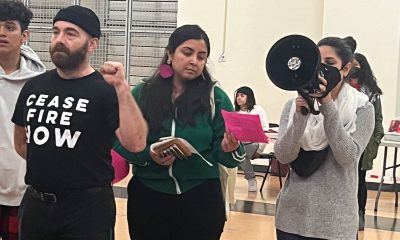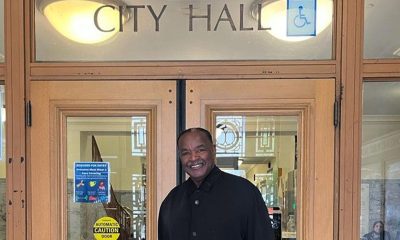Activism
Loren Taylor Hopes to Use Federal “Opportunity Zone” Tax Breaks to Foster Local Development

The Oakland City Council is seeking ways to minimize displacement of tenants and small businesses and leverage community benefits under the federal Opportunity Zone Program in the U.S. tax code created by the Trump Administration, which has so far been criticized for offering huge tax breaks to wealthy investors who open businesses or build real estate projects in low-income urban neighborhoods.
Under current tax regulations, there are no requirements for investors to consult with city governments or create jobs, build affordable housing or other projects to promote equity and programs that would benefit local communities.
Recently, there have been exposés, including in the New York Times, citing how these Opportunity Zone programs around the country have enriched billionaires. Congresswoman Rashida Talib (D – Mich.), among others, is backing legislation to repeal this part of the tax code. “The American people have been scammed,” she said.
Locally, District 6 Councilmember Loren Taylor has been working with the City Administration to design an Opportunity Zone program that can be leveraged to develop projects that serve Oakland neighborhoods, while avoiding some of the most damaging aspects of the Trump regulations that would displace local residents and businesses.
“There has been a very intentional focus on bringing equity and a community orientation to a program that was not designed to do so. We all acknowledge that,” said Taylor, speaking at Tuesday’s Community and Economic Development (CED) Committee meeting.
“We’re doing a little bit of judo, using other people’s momentum against them so that we can advance our own efforts. That’s really what we’re doing on behalf of our community,” he said.
Gloria Bruce of East Bay Housing Organizations said, “This (legislation) carries a lot of urgency about displacement and how investment can happen without displacement. “As currently framed at the federal level, (the regulations) are place-based, not people based; so, we really need to center people in this conversation,” she said. “Nationally, there has been a big amount of investigative reporting, (including) in the New York times, about how this tool has mostly been used to (fund) projects that have already would have happened or things that are luxury development(s). we don’t want that to happen in Oakland.”
The federal government has designated 30 Oakland census tracts in East and West Oakland as Opportunity Zones. Investors who make a long-term investment or property in one of these census tracts can defer or reduce their federal capital gains taxes.
“Oakland’s Opportunity Zones have more renters, higher poverty rates, and larger Black and Latinx populations than the city overall,” according to the report prepared by city staff for Tuesday’s Community and Economic Development (CED) committee meeting.
While the city seeks to promote equity and community benefits in local development, “federal regulations do not currently require local community benefits or investor reporting to local governments, (although) projects must still comply with local development regulation”.
According to the staff report, “…local governments can influence Opportunity Zone investment by highlighting and supporting beneficial local projects.” There are a number of potential local projects proposals, but the underlying obstacle. is where to find funding or investors.
“The City’s Opportunity Zone goals should be to increase engagement and local awareness of the designation, help direct investment to projects that benefit Oakland’s Black population, communities of color and women-owned businesses, and prevent displacement due to loss of affordable residential and commercial space,” the report said.
Seeking to implement Opportunity Zones in Oakland, the city administration has already formed an Opportunity Zone Working Group that includes the Departments of Economic and Workforce Development, Planning and Building, and Housing and Community Development.
The City has also received funding from the Rockefeller Foundation to create a new position, Chief Opportunity Zone Officer, (who has already been hired) to support equitable development in Opportunity Zones, whose work will be supported by two VISTA volunteers.
“The first reported investments in Oakland, as well as nationwide, have been in hotels and primarily market-rate housing located in the Uptown/Downtown area,” the report said. “Funds for projects in West and East Oakland exist but are still raising capital.”
Seeking to repeal the Trump Tax Code regulations, Rep. Tlaib said in a statement, “Opportunity Zones were supposed to help uplift low-income community and those living in poverty, but instead we are seeing them benefit billionaires and their luxury projects….the current Opportunity Zone law fails to drive real benefits to low-income communities instead often rewarding President Trump’s donors.”
Activism
Oakland Post: Week of April 17 – 23, 2024
The printed Weekly Edition of the Oakland Post: Week of April 17 – 23, 2024

To enlarge your view of this issue, use the slider, magnifying glass icon or full page icon in the lower right corner of the browser window. ![]()
Activism
Oakland Schools Honor Fred Korematsu Day of Civil Liberties
Every Jan. 30, OUSD commemorates the legacy of Fred Korematsu, an Oakland native, a Castlemont High School graduate, and a national symbol of resistance, resilience, and justice. His defiant stand against racial injustice and his unwavering commitment to civil rights continue to inspire the local community and the nation. Tuesday was “Fred Korematsu Day of Civil Liberties and the Constitution” in the state of California and a growing number of states across the country.

By Post Staff
Every Jan. 30, OUSD commemorates the legacy of Fred Korematsu, an Oakland native, a Castlemont High School graduate, and a national symbol of resistance, resilience, and justice.
His defiant stand against racial injustice and his unwavering commitment to civil rights continue to inspire the local community and the nation. Tuesday was “Fred Korematsu Day of Civil Liberties and the Constitution” in the state of California and a growing number of states across the country.
One OUSD school is named in his honor: Fred T. Korematsu Discovery Academy (KDA) elementary in East Oakland.
Several years ago, founding KDA Principal Charles Wilson, in a video interview with anti-hate organization “Not In Our Town,” said, “We chose the name Fred Korematsu because we really felt like the attributes that he showed in his work are things that the children need to learn … that common people can stand up and make differences in a large number of people’s lives.”
Fred Korematsu was born in Oakland on Jan. 30, 1919. His parents ran a floral nursery business, and his upbringing in Oakland shaped his worldview. His belief in the importance of standing up for your rights and the rights of others, regardless of race or background, was the foundation for his activism against racial prejudice and for the rights of Japanese Americans during World War II.
At the start of the war, Korematsu was turned away from enlisting in the National Guard and the Coast Guard because of his race. He trained as a welder, working at the docks in Oakland, but was fired after the bombing of Pearl Harbor in 1941. Fear and prejudice led to federal Executive Order 9066, which forced more than 120,000 Japanese Americans out of their homes and neighborhoods and into remote internment camps.
The 23-year-old Korematsu resisted the order. He underwent cosmetic surgery and assumed a false identity, choosing freedom over unjust imprisonment. His later arrest and conviction sparked a legal battle that would challenge the foundation of civil liberties in America.
Korematsu’s fight culminated in the Supreme Court’s initial ruling against him in 1944. He spent years in a Utah internment camp with his family, followed by time living in Salt Lake City where he was dogged by racism.
In 1976, President Gerald Ford overturned Executive Order 9066. Seven years later, the 9th Circuit Court of Appeals in San Francisco vacated Korematsu’s conviction. He said in court, “I would like to see the government admit that they were wrong and do something about it so this will never happen again to any American citizen of any race, creed, or color.”
Korematsu’s dedication and determination established him as a national icon of civil rights and social justice. He advocated for justice with Rosa Parks. In 1998, President Bill Clinton gave him the Presidential Medal of Freedom saying, “In the long history of our country’s constant search for justice, some names of ordinary citizens stand for millions of souls … To that distinguished list, today we add the name of Fred Korematsu.”
After Sept. 11, 2001, Korematsu spoke out against hatred and discrimination, saying what happened to Japanese Americans should not happen to people of Middle Eastern descent.
Korematsu’s roots in Oakland and his education in OUSD are a source of great pride for the city, according to the school district. His most famous quote, which is on the Korematsu elementary school mural, is as relevant now as ever, “If you have the feeling that something is wrong, don’t be afraid to speak up.”
Activism
WOMEN IMPACTING THE CHURCH AND COMMUNITY
Juanita Matthews, better known as “Sister Teacher,” is a walking Bible scholar. She moved to California from the great state of Arkansas in 1971. Sister Teacher has a passion for teaching. She has been a member of Bible Fellowship Missionary Baptist Church since 1971.

Sister Juanita Matthews
55 Years with Oakland Public School District
The Teacher, Mother, Community Outreach Champion, And Child of God
Juanita Matthews, better known as “Sister Teacher,” is a walking Bible scholar. She moved to California from the great state of Arkansas in 1971. Sister Teacher has a passion for teaching. She has been a member of Bible Fellowship Missionary Baptist Church since 1971. She followed her passion for teaching, and in 1977 became the lead teacher for Adult Class #6. Her motto still today is “Once My Student, Always My Student”.
Beyond her remarkable love for the Lord, Sister Teacher has showcased her love for teaching by working for the Oakland Unified School District for 55 years, all but four of those years spent at Emerson Elementary and Child Development School. She truly cares about her students, making sure they have the tools/supplies needed to learn either at OUSD or Bible Fellowship Missionary Baptist Church.
She’s also had a “Clothes Closet Ministry” for 51 years, making sure her students have sufficient clothing for school. The Clothes Closet Ministry extends past her students, she has been clothing the community for over 50 years as well. She loves the Lord and is a servant on a mission. She is a loving mother to two beautiful children, Sandra and Andre. This is the impact this woman of God has on her church and the community.
-

 Activism4 weeks ago
Activism4 weeks agoOakland Post: Week of March 27 – April 2, 2024
-

 #NNPA BlackPress4 weeks ago
#NNPA BlackPress4 weeks agoCOMMENTARY: D.C. Crime Bill Fails to Address Root Causes of Violence and Incarceration
-

 #NNPA BlackPress4 weeks ago
#NNPA BlackPress4 weeks agoMayor, City Council President React to May 31 Closing of Birmingham-Southern College
-

 #NNPA BlackPress4 weeks ago
#NNPA BlackPress4 weeks agoBeloved Actor and Activist Louis Cameron Gossett Jr. Dies at 87
-

 Community1 week ago
Community1 week agoFinancial Assistance Bill for Descendants of Enslaved Persons to Help Them Purchase, Own, or Maintain a Home
-

 Activism3 weeks ago
Activism3 weeks agoOakland Post: Week of April 3 – 6, 2024
-

 Business1 week ago
Business1 week agoV.P. Kamala Harris: Americans With Criminal Records Will Soon Be Eligible for SBA Loans
-

 Activism2 weeks ago
Activism2 weeks agoOakland Post: Week of April 10 – 16, 2024























































